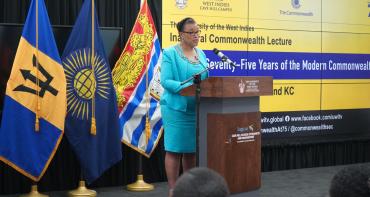At a news conference during a successful first official trip to India, she said that member states were realising once again the importance of the Commonwealth family.

Secretary-General Patricia Scotland has told journalists in New Delhi that Commonwealth countries are coordinating their work more effectively.
At a news conference during her first official mission to India, she said that member states were realising once again the importance of the Commonwealth family.
“What has given me a great deal of pleasure is, people are reawakening to the value of the constellation of these countries,” said the Secretary-General. “All our members are starting to say, this is a diamond that we forget we had. As life gets more difficult, as this troubled and troubling world gets more complex, people are looking at friendships, relationships, which have lasted.”
Over three days Secretary-General Scotland has met ministers, parliamentarians and civil society groups, all of which have pledged to work closer together to help the Commonwealth because they realise the value of being in a membership of 52 countries, spanning a third of the world.
Asked about the Commonwealth's key strengths and added value, the Secretary-General highlighted our shared common language, values, and institutions.
“In terms of facing common challenges and capitalising on opportunities, you’re looking for interoperability. So, if the legal structures make this cheaper and faster, and we now have new global issues, how do we enhance those linkages, so you have mirrored procedures?”
Secretary-General Scotland told reporters this was an historic moment of choice.
“Instead of doing things on our own, how can we do them together?” she asked. “That’s what we’re now doing. I’ve created the Office of Civil and Criminal Justice Reform (OCCJR) to enable us to pool the work that we are doing.
“If you take a small country which may not have enough financial or human resource, but they have to deal with the same problems that India has to deal with, we are saying it is easier, better, faster, cheaper for us to work together than to work on our own.
“So, if you want to spend a pound, we want no-one else to spend the same pound. Spend a different pound, and together we can really help each other to go faster.”
When Secretary-General was asked what she wanted to achieve, she responded that she hoped the newly created Innovation Hub would solve common problems such as tackling climate change, protecting children and empowering women.
“I think I would like to create a tighter nexus between our member countries to assist us to problem-solve better so that we are no longer constantly reinventing the wheel. If one of our members has found a solution to even the smallest problem, this could be shared with the other members.
“That’s what I’d really like to do, and it crosses all the issues. If you look at climate change, which is producing an existential threat to so many of us, it’s not a problem we can solve on our own.
“Finding out what works and finding out what does not work systemically, will probably be one of the biggest contributions we can make to revitalise the Commonwealth, but also to change the outcomes.”
Secretary-General Scotland paid tribute to India for launching the small and medium enterprise (SME) network this May and asked how the Commonwealth could capitalise on this initiative.



